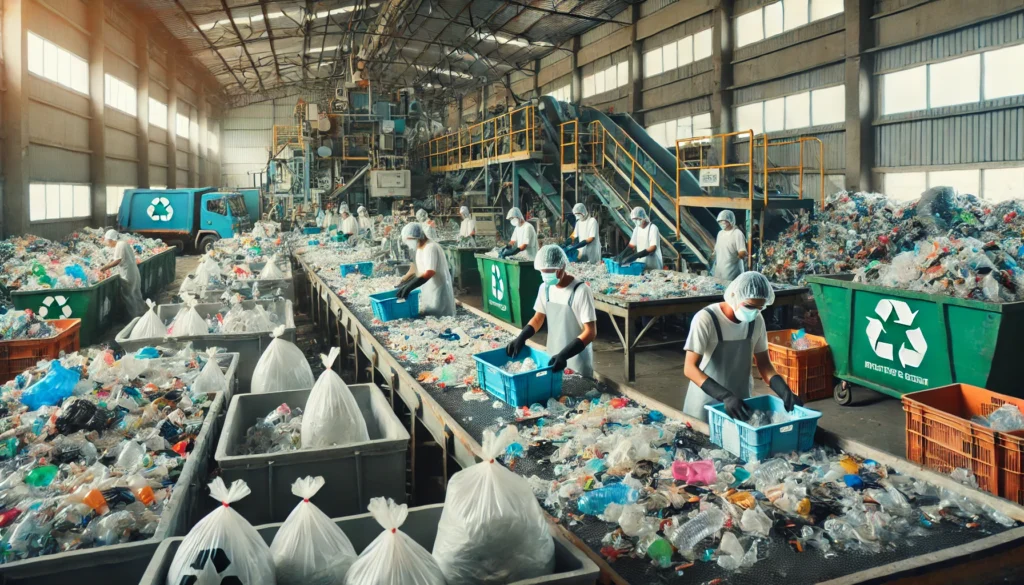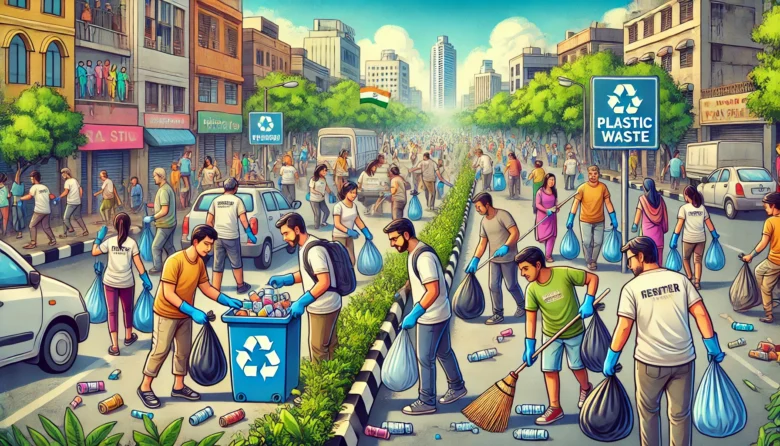Plastic waste impacts everyone, from the crowded areas of Mumbai to the serene deserts of Rajasthan. Managing this waste effectively is not just an environmental necessity but also an economic imperative. In this blog, we’ll explore “The Economics of Plastic Waste Management,” delving into how tackling plastic waste can create economic opportunities, save costs, and contribute to sustainable development in India.
The Scale of the Problem
Plastic pollution is a global crisis, with India contributing a significant share. As reported by the Central Pollution Control Board (CPCB), India produces approximately 3.3 million metric tonnes of plastic waste each year. The challenge is enormous, but so are the opportunities if we manage this waste efficiently.
Economic Benefits of Plastic Waste Management
Job Creation
Managing plastic waste can create numerous job opportunities. From waste collection and segregation to recycling and upcycling, the entire process can generate employment for millions. For instance, informal waste pickers, who are often marginalized, can be integrated into formal waste management systems, ensuring better wages and working conditions.
Cost Savings for Municipalities
Effective plastic waste management can lead to significant cost savings for local governments. Decreasing the amount of waste directed to landfills reduces the costs related to landfill upkeep and pollution management. Cities like Pune and Indore have seen remarkable success by implementing robust waste segregation and recycling programs, resulting in both economic and environmental benefits.

Revenue Generation through Recycling
Recycling plastic waste can be a lucrative business. Companies like Banyan Nation in Hyderabad are pioneering efforts in recycling and converting plastic waste into high-quality recycled plastic. This not only reduces the demand for virgin plastic but also creates a circular economy where waste is continually repurposed, generating revenue in the process.
Boosting the Circular Economy
A circular economy seeks to minimize waste and maximize the use of resources. By promoting plastic recycling and reuse, we can reduce our reliance on new raw materials. This method not only preserves resources but also provides economic advantages by creating new markets and business prospects. For example, companies that manufacture products from recycled plastics can tap into a growing market of eco-conscious consumers.
Challenges and Solutions
Despite the clear economic benefits, several challenges hinder effective plastic waste management in India.
Lack of Infrastructure
Many parts of India still lack the necessary infrastructure for efficient waste management. Investment in modern waste processing facilities and recycling plants is crucial. Collaborations between the public and private sectors can significantly help close this gap.
Public Awareness and Participation
It’s crucial to educate people about the significance of separating and recycling plastic waste. Educational campaigns and community engagement initiatives can encourage more people to participate in waste management efforts. Schools, colleges, and local NGOs can lead these initiatives, creating a culture of sustainability.
Policy and Regulation
Strong policies and regulations are needed to enforce plastic waste management practices. The Indian government has made efforts in this regard, including banning single-use plastics and implementing Extended Producer Responsibility (EPR), which requires manufacturers to be responsible for their plastic products’ disposal. Ensuring strict implementation of these policies is key to their success.
Case Studies and Local Examples
Alappuzha, Kerala
Alappuzha, often referred to as the “Venice of the East,” has implemented an effective decentralized waste management system. The town’s model focuses on source-level segregation, composting, and recycling, significantly reducing the amount of waste sent to landfills. This approach has not only improved sanitation but also created jobs and reduced municipal costs.
Jaipur, Rajasthan
In Rajasthan, Jaipur is making strides in plastic waste management by collaborating with local businesses and NGOs. The city has set up several recycling centers and promotes the use of recycled plastic products. These initiatives have created employment opportunities and helped in managing the city’s plastic waste more efficiently.
The Role of Innovation
Innovation plays a crucial role in transforming plastic waste management. Technologies such as pyrolysis, which converts plastic waste into fuel, and advanced recycling methods can revolutionize how we handle plastic waste. Startups and research institutions in India are at the forefront of these innovations, developing sustainable solutions that can be scaled up across the country.
Conclusion
The economics of plastic waste management presents a compelling case for addressing this pressing issue. By creating jobs, saving costs, generating revenue, and promoting a circular economy, effective plastic waste management can drive sustainable development in India. It’s time for all of us – government, businesses, and citizens – to come together and turn plastic waste into an economic opportunity.
Author’s Note
Writing about the economics of plastic waste management has been an enlightening journey. It’s encouraging to see how addressing environmental challenges can also create economic benefits. Let’s work together to make our planet cleaner and our economy stronger.
G.C., Ecosociosphere contributor.




